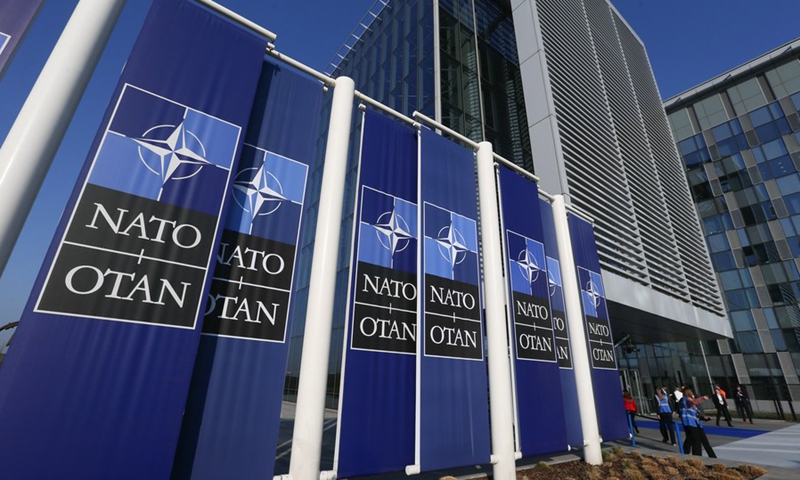
Staff members work at the NATO Headquarters in Brussels, Belgium, March 24, 2022.(Photo: Xinhua)
What is a criminal organization? The average person immediately thinks of local and international drug cartels, human trafficking rings, child pornography societies, gambling sites or the mafia. Perhaps because of an artificially created image, supported by the Western media, NATO is not readily recognized as a "criminal organization."
NATO was not initially a criminal organization. The treaty establishing NATO on April 4 1949 stipulated in article 5:
"The Parties agree that an armed attack against one or more of them in Europe or North America shall be considered an attack against them all and consequently they agree that, if such an armed attack occurs, each of them, in exercise of the right of individual or collective self-defence recognised by Article 51 of the Charter of the United Nations, will assist the Party or Parties so attacked by taking forthwith, individually and in concert with the other Parties, such action as it deems necessary, including the use of armed force, to restore and maintain the security of the North Atlantic area."
Initially NATO had a legitimate security objective, compatible with Chapter VIII of the UN Charter (Arts. 52-54), which allows regional arrangements, provided that these are consistent with the object and purpose of the UN Charter, and are subordinated to the UN Security Council. Indeed, pursuant to article 103 of the Charter ("supremacy clause"), in case of conflict between any treaty and the Charter, it is the Charter that takes precedence.
For as long as the Soviet Union threatened Western Europe and intended Western expansion, it was legitimate for Western countries to take measures of collective security. One consequence of the NATO treaty is that the Soviet Union organized a competing alliance called the Warsaw Pact (1955-1991) and that the threat of mutual assured destruction through nuclear weapons deterred both camps from attacking each other. This changed in 1989, when the peace-loving Soviet leader Mikhail Gorbachev withdrew Soviet forces from Central and Eastern Europe and was promised by then US president George H.W. Bush and secretary of state James Baker, that NATO would not move "one inch" eastward.
For a brief shining moment, the possibility of world peace seemed achievable with mutual disarmament. This dream was smashed by US president Bill Clinton, when he decided to follow the advice of neo-cons and an imperialist roadmap by political scientist Zbigniew Brzezinski, who concocted the idea of a unipolar world under a hegemon, the US, which essentially would replace the UN. Clinton's decision to expand NATO eastwards, in violation of binding promises, was strongly decried by George F. Kennan as a "fateful error" in his essay in The New York Times of February 5 1997.
After 1997, NATO gradually morphed from a "defensive" alliance to a geopolitical behemoth to subjugate the rest of the world. Already in the 1990s, NATO countries participated in the destruction of the territorial integrity of Yugoslavia, and in 1999, without the consent of the UN Security Council, NATO bombarded Yugoslavia thereby violating Article 2(4) of the UN Charter. NATO's war of aggression in 1999 was a dress rehearsal for what would follow. It also entailed serious war crimes, including indiscriminate bombardment of civilian centers and the use of indiscriminate weapons, such as depleted uranium and cluster bombs. Yugoslavia was only the prelude to a series of aggressions against Afghanistan, Iraq, Libya and Syria and elsewhere, during which war crimes and crimes against humanity were perpetrated in total impunity. The International Criminal Court, which is essentially in the service of the "collective West," failed to investigate these crimes and no Western politician or military leader was ever indicted.
At the Nuremberg trials in 1945-46, the American delegation had envisaged to try 14 organizations as criminal, later narrowed to six -the Reich Cabinet, the Leadership Corps of the Nazi Party, the Gestapo, the SA, the SS and the SD, and the General Staff and High Command of the German military (Wehrmacht). The aim was to have these organizations declared retrospectively criminal, so their members could be tried faster for mere membership. Of course, the concept violates the rule of law, because it entails collective punishment and subverts the principle of the presumption of innocence. While the Nuremberg judgment considered that three organizations were criminal per se, it did not hold the SA, the Reich Cabinet or the Wehrmacht as criminal. The Nuremberg judgment, however, did create a precedent (and a bad one), which could be applied to NATO countries and NATO forces. This, however, is not necessary, since the violations of The Hague and Geneva Conventions by NATO forces are so well documented, that any tribunal with appropriate jurisdiction could try members of NATO forces under already existing Conventions without having to rely on the concept of a criminal organization.
The bottom line is that while NATO forces since the 1990s have committed war crimes and crimes against humanity, what is important today is that world public opinion recognizes NATO as a threat to the peace and security of humankind. Its serial provocations constitute the greatest danger to our survival as a species. While NATO deserves the label "criminal organization," what is crucial is not conducting war crimes trials, but neutralizing the threat.
The author is professor of international law at the Geneva School of Diplomacy and former UN independent expert. opinion@globaltimes.com.cn




